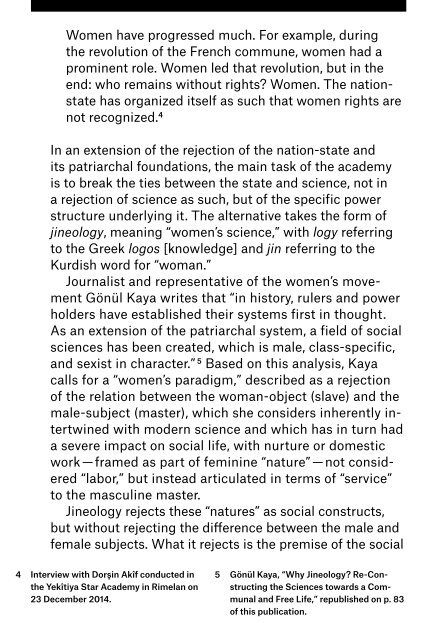Stateless Democracy
NWA5-Stateless-Democracy1.pdf?utm_content=buffer7beda&utm_medium=social&utm_source=twitter
NWA5-Stateless-Democracy1.pdf?utm_content=buffer7beda&utm_medium=social&utm_source=twitter
You also want an ePaper? Increase the reach of your titles
YUMPU automatically turns print PDFs into web optimized ePapers that Google loves.
Women have progressed much. For example, during<br />
the revolution of the French commune, women had a<br />
prominent role. Women led that revolution, but in the<br />
end: who remains without rights? Women. The nationstate<br />
has organized itself as such that women rights are<br />
not recognized. 4<br />
In an extension of the rejection of the nation-state and<br />
its patriarchal foundations, the main task of the academy<br />
is to break the ties between the state and science, not in<br />
a rejection of science as such, but of the specific power<br />
structure underlying it. The alternative takes the form of<br />
jineology, meaning “women’s science,” with logy referring<br />
to the Greek logos [knowledge] and jin referring to the<br />
Kurdish word for “woman.”<br />
Journalist and representative of the women’s movement<br />
Gönül Kaya writes that “in history, rulers and power<br />
holders have established their systems first in thought.<br />
As an extension of the patriarchal system, a field of social<br />
sciences has been created, which is male, class-specific,<br />
and sexist in character.” 5 Based on this analysis, Kaya<br />
calls for a “women’s paradigm,” described as a rejection<br />
of the relation between the woman-object (slave) and the<br />
male-subject (master), which she considers inherently intertwined<br />
with modern science and which has in turn had<br />
a severe impact on social life, with nurture or domestic<br />
work — framed as part of feminine “nature” — not considered<br />
“labor,” but instead articulated in terms of “service”<br />
to the masculine master.<br />
Jineology rejects these “natures” as social constructs,<br />
but without rejecting the difference between the male and<br />
female subjects. What it rejects is the premise of the social<br />
construct that articulates differences in the context of<br />
patriarchal society. Jineology explores feminine, colonized<br />
history and science as knowledge that can sustain Rojava’s<br />
“ecology of freedom,” as Öcalan adapted anarchist Murray<br />
Bookchin’s concept of “social ecology.” On the curriculum<br />
are not only the works of Öcalan and Bookchin, but also<br />
those of Michel Foucault and Judith Butler, forming together<br />
the philosophical pillars of this political and scientific<br />
struggle.<br />
Zîlan Diyar, a female guerrilla fighter, ironically comments<br />
on Western media outlets that, rather than exploring<br />
the ideological dimension of the struggle, “are<br />
so inspired by the clothes that the women are wearing,<br />
that they want to start a new fashion trend!” 6 Dilar Dirik<br />
considers this side-stepping of ideological struggle for the<br />
benefit of the orientalist, sensationalist imaginary as the<br />
very problem the Kurdish Women’s Movement was founded<br />
to struggle against:<br />
Rather than trying to understand the phenomenon in<br />
all its complexity, these articles often resort to sensationalist<br />
statements to exploit the audience’s astonishment<br />
over the fact that “the poor women in the Middle<br />
East” could somehow be militants. Hence, instead of<br />
acknowledging the cultural revolution that the actions<br />
of these women constitute in an otherwise conservative,<br />
patriarchal society, many reporters fall for the<br />
same used-up categories: while state media, especially<br />
in Turkey and Iran, portray female guerrilla fighters<br />
as “evil terrorist prostitutes,” family-hating, brainwashed<br />
sex toys of the male fighters, Western media<br />
often refers to these women as “oppressed victims<br />
looking for an escape from their backward culture,”<br />
238–239<br />
4 Interview with Dorşin Akîf conducted in<br />
the Yekîtiya Star Academy in Rimelan on<br />
23 December 2014.<br />
5 Gönül Kaya, “Why Jineology? Re-Constructing<br />
the Sciences towards a Communal<br />
and Free Life,” republished on p. 83<br />
of this publication.<br />
6 Zîlan Diyar, “The Whole World is Talking<br />
About Us, Kurdish Women,” republished<br />
on p. 73 of this publication.


